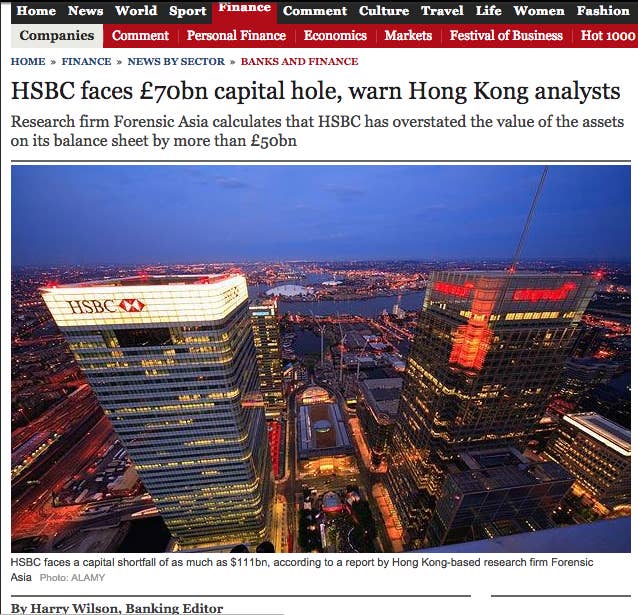
The Daily Telegraph quietly removed a news report from its website alleging HSBC has a £70 billion hole in its finances, even though the claim came from independent analysts and was widely reported on many other major financial news websites.
The article, which was published in January 2014, reports criticism of the bank's financial model. But it has since vanished from the newspaper's website with no reason given for its deletion. Rival sites such as Bloomberg News and CNBC have stuck by the story, which reports claims that the banking giant may require a major injection of new funds over the coming years.
The newspaper's former chief political commentator Peter Oborne alluded to the deletion of this article – written by former banking editor Harry Wilson – in his incendiary resignation letter. Oborne alleged that HSBC holds excessive sway over the paper's financial coverage due its status as a major advertiser. The Telegraph denied his claims and said its editorial operations remain independent.
Wilson's tweet linking his HSBC piece remains live, although the actual article is no longer available online. It is not clear why the article is no longer on the newspaper's website.
HSBC faces £70bn capital hole warn Hong Kong analysts | via @Telegraph http://t.co/gzKhOlOheE
BuzzFeed News has now obtained a copy of the deleted article, which suggests HSBC may "ultimately need a capital injection of close to £70bn before the end of this decade, according to an incendiary report published by a Hong Kong-based research firm".
Other HSBC-related articles we have identified as being removed from the Telegraph website include a piece naming the singer James Blunt as an individual who holds an offshore account with the bank's Jersey arm. It was previously available at this link.
HSBC has historically been a major advertiser with the Telegraph. In 2010 it pioneered an innovative form of wraparound advertising covering the front page in transparent paper as part of a campaign to promote business loans. At the time The Guardian described the campaign as a "vivid display of the increasing co-operation between editorial and commercial departments at the Telegraph".
Speaking on Channel 4 News this evening, Oborne said he and his former Telegraph colleagues had lost all faith in the newspaper's management: "We have no confidence at all in [chief executive] Murdoch MacLennan and we have no confidence at all in the Barclay brothers who own the paper".
The deleted January 2014 Telegraph article on HSBC can be read in full below:
HSBC faces £70bn capital hole, warn Hong Kong analysts
Research firm Forensic Asia calculates that HSBC has overstated the value of the assets on its balance sheet by more than £50bn
HSBC could have overstated its assets by more than £50bn and ultimately need a capital injection of close to £70bn before the end of this decade, according to an incendiary report published by a Hong Kong-based research firm. Forensic Asia on Tuesday began its coverage of Britain's largest banking group with a 'sell' recommendation, warning the lender had between $63.6bn (£38.7bn) and $92.3bn of "questionable assets" on its balance sheet, ranging from loan loss reserves and accrued interest to deferred tax assets, defined benefit pension schemes and opaque Level 3 assets.
The broker's note is written by two of its senior analysts, Thomas Monaco and Andrew Haskins.
Mr Monaco is a former senior bank examiner at the Federal Reserve Bank of New York and previously worked as a fund manager at FrontPoint Partners, the hedge fund that spotted the US subprime bubble. As well as this, he has also spent a decade as a banks analyst at various leading investment banks.
Mr Haskins previously worked at HSBC for 15 years, mainly as a telecoms analyst, and also co-ran Japanese bank Mitsubishi UFJ's Hong Kong-based research team.
In the report, the analysts apply what they describe as a "moderate stress test" to the balance sheets of HSBC's major subsidiaries. From this analysis they conclude that even using a low-end estimate, the assets of the bank's Hong Kong division, for instance, are overstated by about $15bn, while those of its UK subsidiary could be overvalued by $17bn.
Taking the analysis further, the report sets out the impact of incoming Basel III capital rules and says HSBC could be required at a minimum to raise close to $60bn in new capital by 2019 and potentially as much as $111bn.
"In our view, HSBC has not made the necessary adjustments, during the quantitative easing reprieve. Rather, it has allowed legacy problems to linger as new ones in emerging markets gather pace. The result has been extreme earnings overstatement, causing HSBC to become one of the largest practitioners of capital forebearance globally. This charade appears to be ending, given how few earnings levers remain besides selling off core elements of the franchise and the stringencies of Basel III compliance," wrote Forensic Asia.
The broker adds: "While having stated capital ratios well above peer averages is all well and good, HSBC's stated capital ratios would appear to be nothing more than a mirage if our analysis is correct."
Even under current capital rules, Forensic Asia estimates that its valuations of HSBC's group and subsidiary balance sheets suggests the bank has a current capital shortfall of $45.1bn.
The report adds the workings do not include probable litigation costs linked to various claims on the bank, which they see coming in at no less than $10bn.
HSBC, Britain's biggest bank by market capitalisation and total assets, is also reckoned to be the UK's best capitalised major lender, with a tier 1 ratio of 12.8pc, well above the minimum required by the Prudential Regulation Authority.
HSBC declined to comment.
